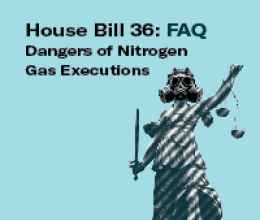HB 663 excludes from the definition of “public record” any information and records that relate in any manner to the execution of a death sentence.
These records are made confidential, and not subject to any form of disclosure under the Public Records Law, as well as for the media and defense counsel during any legal cases. This includes determining the manufacturing origin of any drugs used during the lethal injection process or the combination of drugs that may be administered.
The bill also prohibits a licensing authority for professions such as doctors or pharmacists from taking any disciplinary action against a licensee for participating in an execution by lethal injection, even if they violate oaths taken to receive a license.
Amended in the Senate, HB 663 now includes a sunset provision so the bill will likely be revisited in two years.
A previous provision voiding state, national or international contracts was completely removed from the bill.
Several non-controversial recommendations from the Joint Task Force to Review the Administration of Ohio’s Death Penalty were also added.
Jurisdiction/Legislation Level
State
LCS Legislation Status
http://lsc.state.oh.us/coderev/hou130.nsf/House+Bill+Number/0663?OpenDoc...
Our Take on This Bill
The ACLU of Ohio strongly opposes HB 663 as it allows the government to perform executions under a cloak of secrecy, violates several constitutional provisions, and interferes with the professional code.
In the past decade, Ohio has had major problems with executions, including four botched executions. In light of the recent challenges to Ohio’s lethal injection procedures and compounds, it is critical to maintain transparency and accountability.
HB 663 will inhibit prisoners’ due process rights by making the information necessary to challenge the constitutionality of Ohio’s lethal injection classified. Without the information necessary to challenge Ohio’s lethal injections, the state can carry out executions that do not adhere to our Constitution and basic human decency virtually unchallenged.
Additionally, licensing agencies should have the ability to enforce their professional guidelines and duties without interference from the state.
Although HB 663 was significantly amended in the Senate, fundamental problems with the bill still remain. HB 663 will still enable the state to perform secret executions. The ACLU of Ohio urges Ohio’s legislators to carefully consider the consequences of killing in secret with the enactment of this bill.
Bill Status
Introduced on 11/10/14
Testimony on 11/18/14
Passed out of the House Policy and Legislative Oversight Committee on 11/20/14
Passed the House on 11/20/14
Passed out of the Senate Criminal Justice Committee on 12/11/14
Passed the Senate on 12/11/14
House Concurred to Senate Amendments 12/17/14
Signed by the Governor 12/19/14
Committees
Civil Justice (S), Policy and Legislative Oversight (H)







